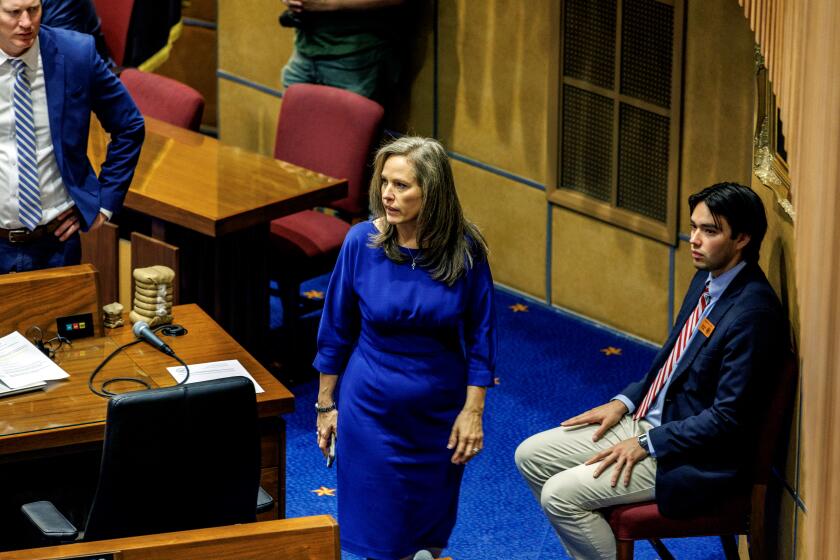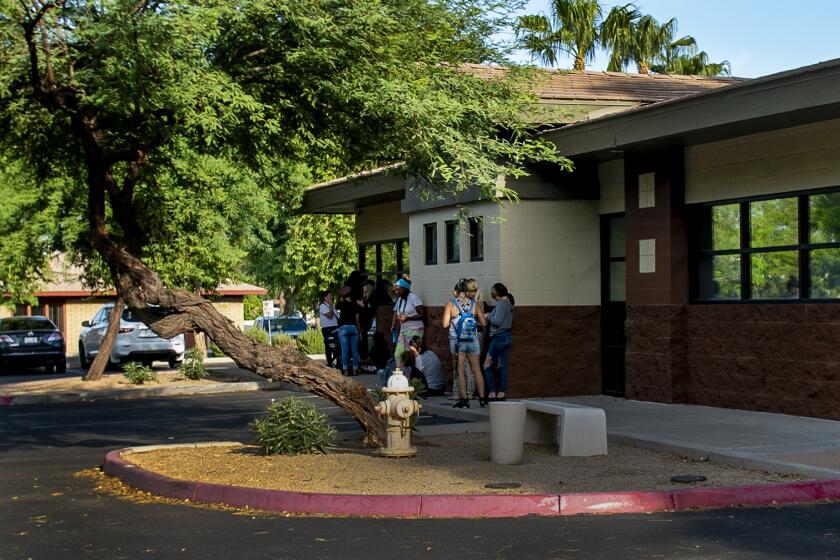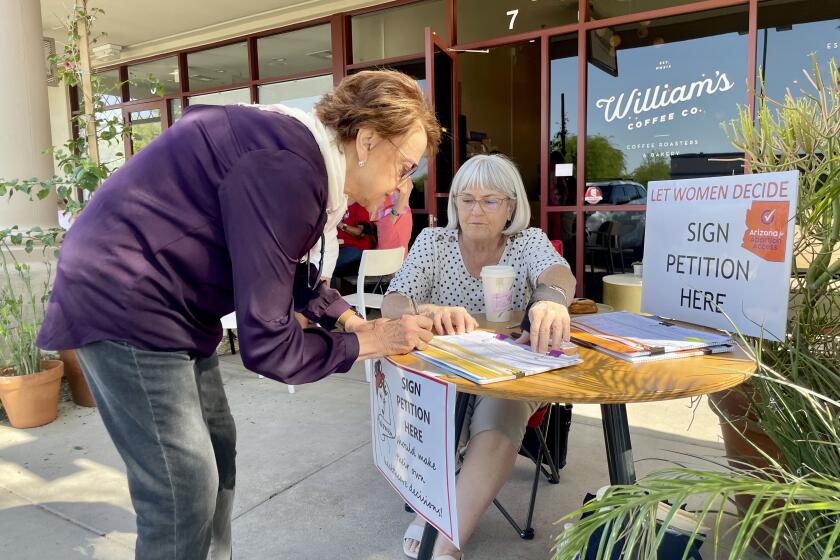Abortion rights advocates in Arizona submit needed signatures to put issue on November ballot

PHOENIX — Arizona abortion rights supporters on Wednesday turned in more than double the signatures needed to put the issue on November’s ballot in the key swing state.
Organizers say they submitted 823,685 signatures, far above the 383,923 required, from registered voters. The measure would add an amendment to the state constitution providing a fundamental right to an abortion if voters approve it.
County election officials have until Aug. 22 to verify whether enough of the petition signatures are valid and provide results to the Arizona secretary of state’s office.
Activists in two other states — Nebraska and Arkansas — also are planning to submit signatures this week for ballot measures about abortion. If successful, those states and Arizona will join five others where the issue is set to go before voters this year: Colorado, Florida, Maryland, Nevada and South Dakota.
Arizona state Sen. Shawnna Bolick was one of two Republicans who voted to repeal a 1864 abortion ban. Her husband, Arizona Supreme Court Justice Clint Bolick, had ruled in its favor. Both are on the ballot in November.
The issue is a key part of Democratic campaigns in this year’s elections. Opponents of the proposed amendment say it goes too far and could lead to unlimited and unregulated abortions in Arizona. Supporters say a change in the state’s constitution is necessary to ensure that abortion rights cannot be easily erased by a court decision or legislative vote.
The proposed constitutional amendment would allow abortions in Arizona until a fetus could survive outside the womb, typically around 24 weeks, with exceptions to save the parent’s life or to protect her physical or mental health. It would restrict the state from adopting or enforcing any law that would prohibit access to the procedure.
Arizona currently has a 15-week abortion ban in place.
Officials with Arizona for Abortion Access, a coalition that includes the American Civil Liberties Union of Arizona and Planned Parenthood of Arizona, turned in hundreds of boxes of signed petitions to the Arizona secretary of state’s office Wednesday morning.
The Arizona Supreme Court’s ruling Tuesday made abortions illegal, except when a mother’s life is at risk. Attention quickly turned to the November election.
Arizona for Abortion Access spokesperson Dawn Penich said it was the most signatures ever submitted for a citizens initiative in state history.
“That was our goal from the get-go,” Penich said. “We started collecting signatures in September and October 2023 and saw how passionate people are about this issue.”
Arizona’s current abortion ban was signed into law in 2022 and includes exceptions in cases of medical emergencies and has restrictions on medication abortion. It also requires that an ultrasound exam be performed before an abortion is done, as well as parental consent for minors.
Two months ago, the Arizona Supreme Court upheld an 1864 abortion ban that permitted the procedure only to save the mother’s life and provided no exceptions for survivors of rape or incest. But the Republican-controlled Legislature voted for a repeal of the Civil War-era ban, and Democratic Gov. Katie Hobbs quickly signed it. The 19th century law had been blocked in Arizona since the U.S. Supreme Court’s 1973 decision in Roe vs. Wade that affirmed the constitutional right to abortion nationwide.
As abortion politics and policy clash in Arizona and threaten to sway the swing state, GOP lawmakers scramble to address the issue amid fallout from a ruling reviving an 1864 ban.
In Nebraska, organizers of a petition to enshrine abortion rights in the state constitution have expressed confidence that they’ve gathered enough signatures to get it on the November ballot.
Allie Berry, campaign manager for Protect Our Rights, and organizers of a competing petition effort to codify Nebraska’s 12-week abortion ban in the state constitution would not say how many signatures they had gathered ahead of Wednesday’s deadline.
Both efforts, as well as a third that would ban abortion at all stages by deeming embryos as people, must turn in valid signatures of 10% of registered voters in the state — around 123,000 signatures — to qualify for the ballot.
The total abortion ban effort in Nebraska started eight weeks ago and is unlikely to gather the signatures it needs. The 12-week ban proposal — which kicked off in March thanks to a $500,000 donation from Nebraska Republican U.S. Sen. Pete Ricketts — has made a furious 11th-hour push to gather signatures but has telegraphed that it might not meet the threshold.
Supporters of an Arkansas proposal to scale back the state’s abortion ban face a Friday deadline to submit petitions to qualify for the November ballot.
As Biden battles for reelection, he’s counting on reluctant voters to come around and measures such as Arizona’s abortion rights initiative to prod them his way.
The group behind the measure, Arkansans for Limited Government, said on Facebook and Instagram on Tuesday that it still needed 8,200 signatures. The group must submit at least 90,704 valid signatures from registered voters to qualify.
The proposed constitutional amendment would prohibit the state from banning abortion within the first 18 weeks of pregnancy. The proposal includes exemptions for rape, incest and fatal fetal anomalies and to protect the mother’s life. It would also exempt abortions performed to protect the mother from a physical disorder, physical illness or physical injury.
Arkansas banned nearly all abortions under a law that took effect when the U.S. Supreme Court overturned Roe vs. Wade. Arkansas’ ban currently exempts abortions only to protect the mother’s life in a medical emergency.
Berry and Snow write for the Associated Press. AP reporters Margery A. Beck in Omaha and Andrew DeMillo in Little Rock, Ark., contributed to this report.
More to Read
Sign up for Essential California
The most important California stories and recommendations in your inbox every morning.
You may occasionally receive promotional content from the Los Angeles Times.














